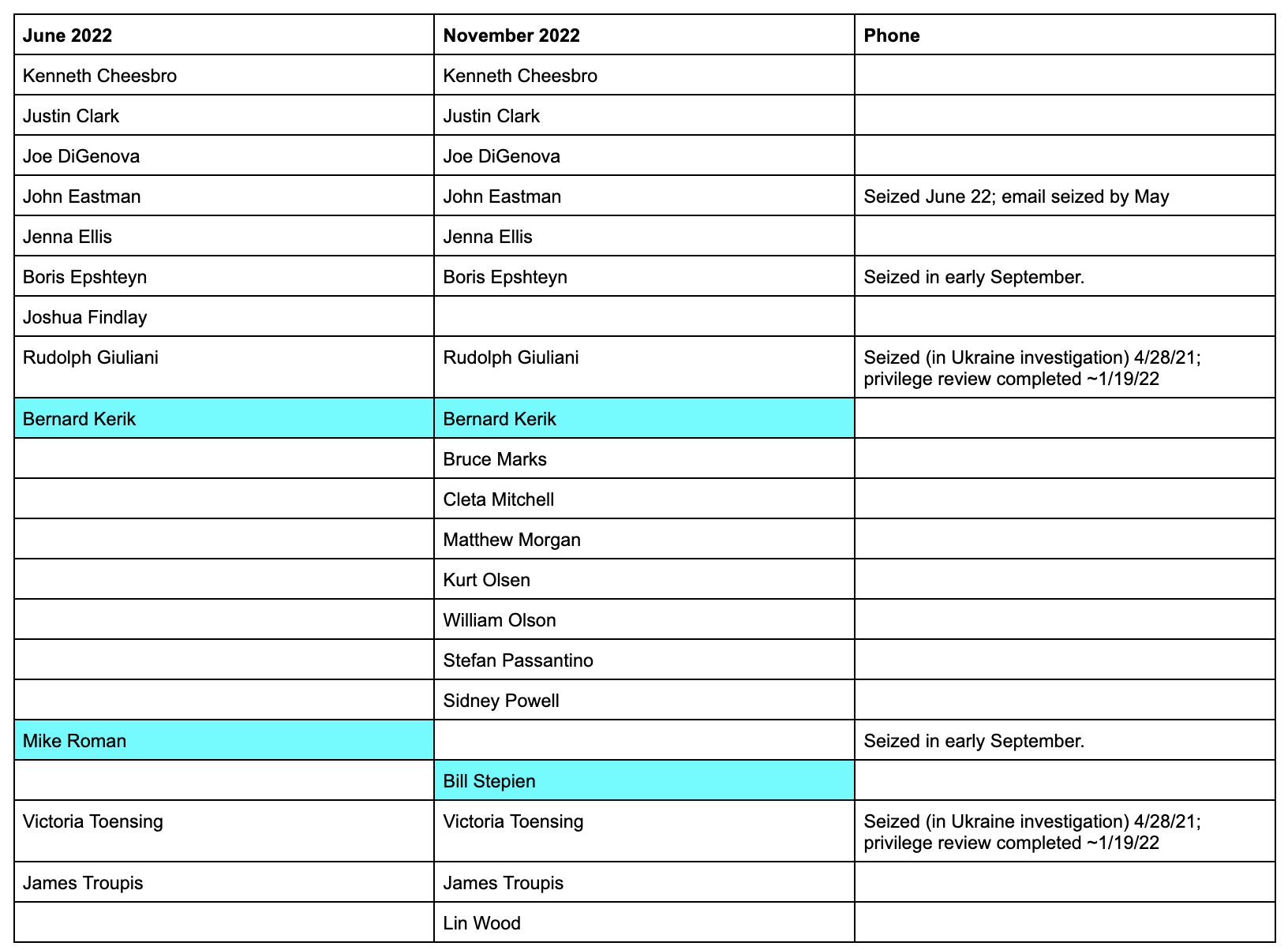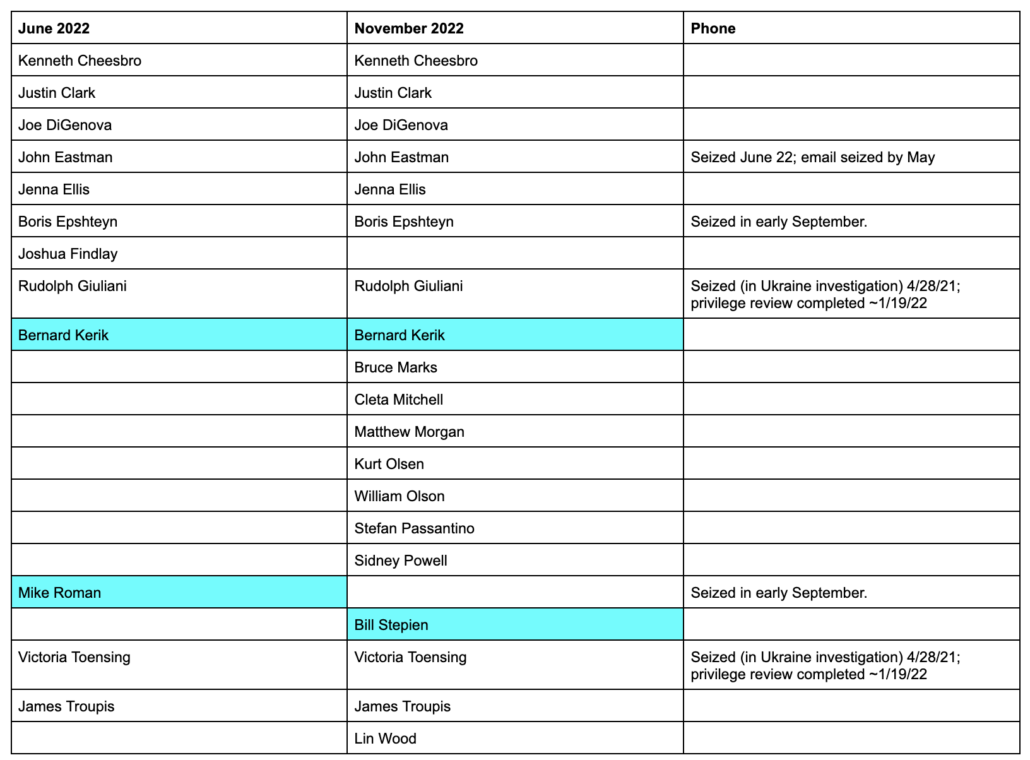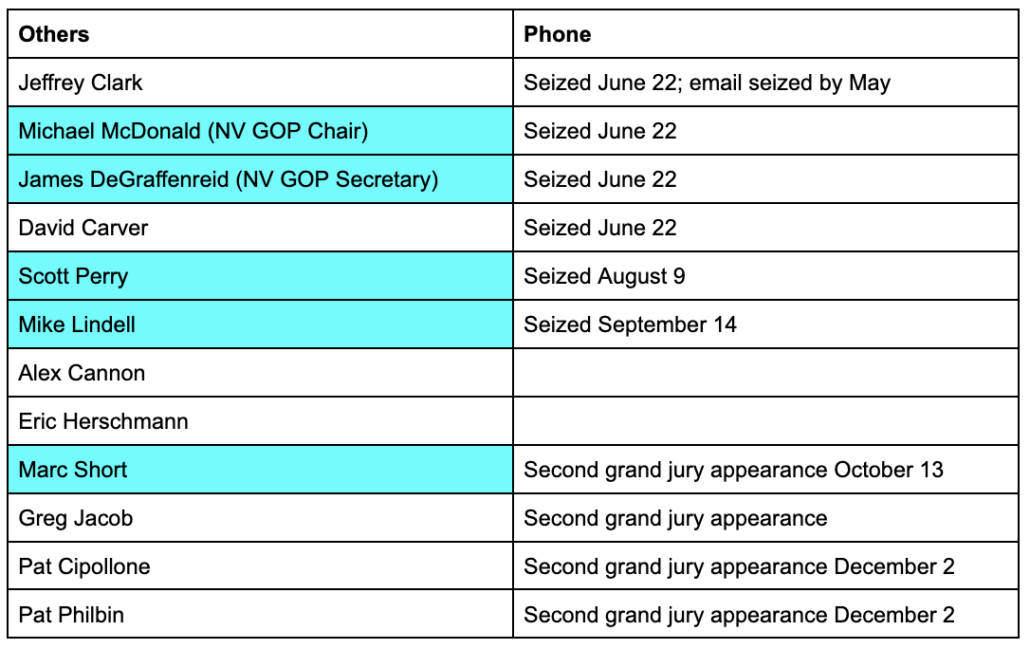At Least 25 Lawyers Are Subjects or Witnesses in the Various Trump Investigations
Between the release of the January 6 Committee transcripts and the unsealing of some grand jury orders from last summer, I’ve been pondering how many lawyers were central to Trump’s efforts to steal the 2020 election. Consider this table, for example, which is based on two separate sets of subpoenas (June, November) sent out to the swing states Trump tried to steal. Only the people marked in blue are not lawyers.
Eighteen people on this list — all people who played key roles in one or various plots — have a colorable claim to have played the role of an attorney, though the J6C transcripts show that for some — Boris Epshteyn and Jenna Ellis, for example — there was some dispute about whether they were functioning as lawyers or some other role, like spokesperson. And Sidney Powell was famously formally separated from the campaign.
Add those 18 people to the lawyers on this list, which includes state officials reported to have had their phones seized, Jeffrey Clark (who’s not on the fake elector warrants but is a subject based on other factors), Mike Lindell (whose phone was seized as part of the Colorado investigation into accessing voter machines) as well as five other lawyers known to be witnesses to key parts of the various plots.
Four of these people — the two Pats, Greg Jacob, and Marc Short — were reported to have had Trump’s Executive Privilege claims overridden by Chief Judge Beryl Howell for follow-on appearances before grand juries.
With seven more lawyers added to the list, that’s a total of 25 witnesses, all of whom have to be treated with kid gloves to avoid blowing the entire case.
That’s one reason I’m interested in a detail from the February 24 J6C transcripts from Michael McDonald (NV GOP Chair) and James DeGraffenreid (another NV fake elector). Both men pled the Fifth — there were aspects of Nevada’s fake elector certificates that even Trump’s people admitted presented more serious legal problems. Neither man is an attorney. And both men claimed to have retained the Signal and Telegram texts they had sent using their phones.
Q On your personal devices, did you use any secured messaging applications like Signal, telephone [sic], or WhatsApp?
A Yes, sir.
Q And did you search those applications for any materials that might be responsive to the subpoena?
A Yes, sir.
We saw that DOJ used Scott Perry’s role in the Jeffrey Clark node to identify unprivileged communications (though that approach also yielded a lot of junk communications). I would imagine that that makes people like Mike Roman (who ferried fake elector certificates around but has been dropped from subpoenas) and the two NV fake electors particularly important to chiseling away at privilege claims.







And not a single state bar requires them (or any other member of the Bar) to report their activities to the Bar for its consideration in continuing to allow them to be members. It’s like they don’t want to self-police their “profession” and are willing to allow it to continue to rot.
“The first thing we do, let’s kill all the lawyers.”
-State Bar Associations Everywhere (and DC!)
Yeah, this is not a state bar issue. Also, fuck Shakespeare.
Besmirching Shakespeare – nice!
Defund Attorney Discipline Boards!
Right? It gets so tiresome. No one is good enough. Not even Shakespeare.
Right. And it is still almost never a state bar issue.
Shakespeare wrote this line as coming from someone who was illegally usurping the throne
People seem to forget that that overused quote from the bard was how a group intended to cement a revolution, by removing the lawyers that kept government’s memory and kept it functioning.
Thank you for expressing that succinctly. To put it in the mouths of some of the J6 crew and their Congressional sympathizers, “First thing we kill, let’s kill all of DOJ”.
Goes along with another overused-quote, “There is no there there”…Gertrude Stein’s lament at the loss of the Oakland neighborhood where she grew up.
I recommend reading the whole of Henry VI Part 2, or at the very least the rest of act IV scene 2. Shakespeare was, of course, writing to please the elites of his day, and catering to their snobbery, but Cade is Trump to a T, and his crew are all Trumpistas.
“A little knowledge is a dangerous thing,
Drink deep, or touch not the Pierian spring.”
Great play–my favorite of the History Plays. And great comment thread.
Dealing with all the privilege issues is yet another reason why the selection of Jack Smith – former head of the DOJ Public Integrity Section – to oversee this whole investigation makes a lot of sense. This is not a time to have someone in charge who has never particularly walked through that legal thicket before.
And the words “at least” in the title are well chosen, IMHO. Any investigation involving the WH, Congress, multiple state governmental offices around the country, and national campaign organizations is going to be tripping over lawyers every time they turn around.
Making Attorneys Get Attorneys
Self-licking ice cream cone.
Everlasting gobsmacker
However, in contrast to Trump and other non-lawyers who raise frivolous claims of, e.g. executive privilege to avoid disclosure of percipient knowledge of [or participation in] crimes, lawyers raising frivolous privilege claims to conceal such unprivileged information likely place their bar cards on the line — and I would imagine few jurisdictions if any require proof beyond a reasonable doubt of the violation of the rules of professional conduct to suspend or revoke a law license. Thus, their status as attorneys in some cases might actually reduce their inclination to be obstructive.
Of course, it’s equally true that “their status as attorneys in some cases [is a prerequisite] to be obstructive.”
Many of the claims are real, though. And again, if DOJ doesn’t exercise caution here, this will be what blows it all to hell.
Yes.
How much confidence may we have that DOJ can navigate the minefield successfully? Am I naive to believe (as I do) that they will do so?
A prerequisite of a law license is your inviolable promise (oath) that you will always support and defend the Constitution in all situations. I know we have had a debate on wether a lawsuit is frivolous or fraudulent but with either does not an attorney by filing either knowingly poking the court and the judicial system with bullshit filings are wasting the courts and judges time that cost the taxpayers money. Specifically I am referring to the minimum of 60 court filing claiming voter fraud. Is there a reason that punishment for these types of repeated filing is not met with swifter retribution from the courts that they abuse? I do know some have face penalties and suspension of licenses but the process seems take an a long time, two years and counting for this form of “justice” to be handed down to those that commit these violations. I only hope some or all of these attorneys face severe consequences for their actions for participating in the insurrection.
No. Defending the Constitution means also defending people maybe against it. Due Process is for all, not just those you believe in.
I do believe it was Due Process that gave me a potential opportunity for appeal and a settlement that I chose instead. But I’m not sure. Still, I say, “Long live Due Process!”
Due Process is not perfect, but it is necessary as a goal.
Thank you for the response. Due Process takes the time. In these cases, after already being adjudicated by one court, the Due Process, would that be the appeal to a higher court?
Yes, occasionally, sometimes painfully, it does include appellate rights.
Hear, hear!
Those 60+ filings were made in multiple jurisdictions, citing a variety of state laws and constitutional provisions. While the basic “the election is being stolen” chant might be the same, the lawyers involved had to base their filings on the applicable state laws and constitutional language. Simply lumping them together as if the exact same case was filed in 60+ courts, hoping they could find one judge who would accept their argument is wildly off base.
That’s not to say that these filings weren’t crap — and many of them on their face — but simply looking at the number and saying these are repeated filings of the same suit is wrong.
Non-lawyers often think state bars are good at policing lawyer conduct. Here in California, Tom Girardi put a flaming public stake through that idea with a spectacular scandal. Now the State Bar is trying to refurbish their reputation. Trial judges and opposing counsel do a better job of keeping lawyers in line than the bars.
Yes, and CA is not unique in that regard.
State bar authorities are not often rigorous in imposing their own standards. They spend more time on low hanging fruit: small practitioners who screw up. Lawyers at large firms rarely face discipline, and it’s not because they’re better lawyers.
Sadly, many professional associations are lame at imposing self-discipline, medical doctors among them. I see it as an analog to corporate self-regulation, one of the GOP’s great oxymorons. One of the most sought after attributes of real power is to be free from the consequences of abusing it. Corporate life is filled with it.
Kenneth is crunchy flamin’ cheddar. Of course a Cheeto President has a Cheese Bro for his lawyer.
Speaking of lawyers, Politico has a piece up where they detail which lawyers/law firms were representing which witnesses before the Jan 6 committee.
Yup. I keep linking it, bc I’m grateful someone did it before I had to. A real book-mark worthy piece.
Some of the coup efforts involved using law or other complex processes to their ends. That takes attorneys.
Delay is very important to the coupsters. Narrowly, the attorney/client privilege claims, like the executive privilege claims, and like the claims that didn’t say what privilege was invoked, gum up the gears of process and add delay. More broadly, attorneys are good at navigating process for all kinds of ends, including delay.
This particular group of attorneys seems to be trying to stay right on the borders between legit delays and frivolity, sanctions, and bar proceedings. Sometimes they get lucky (judge Cannon) and get a lot of delay, sometimes they find themselves on the wrong side of the line and owe fees, get sanctioned, whatever.
Yet they are creating a lot of delay. I read this site to learn more about the processes and the actions (among other valuable learnings.) One punch line of the last 27 months or so is that the coupsters, with not much in the way of facts or law on their side, is creating a remarkable amount of delay.
Delay = obstruction
The coup continues by other means — they’re obstructing the progress of prosecution by weaponizing democracy against itself, playing the weak points in due process for all they’re worth.
In doing so they not only buy time until they have a favorable government in place which will protect them, but also radicalize some on the left by sowing fear, uncertainty, and doubt by the lack of obvious and aggressive prosecution, thereby undermining democracy even more.
I would love to see more work done about the Republican Attorneys General Association — yet more attorneys though not all were as central to the January 6 conspiracy.
Are Special Masters required for every one of these subpoenas?
PS, off topic: did the DOJ respond to your request to unseal the transcripts on the Espionage Act?
No.
News about that can be found here:
https://www.emptywheel.net/2023/01/06/sdny-calls-dojs-definition-of-the-espionage-act-an-academic-interest/
I’ve been curious about what people are seeing regarding the use of lawyers to shield communications and share information. I remember something about making sure there’s an attorney representing multiple parties so that all their communications with each other could be privileged and they could share info. This came up in regard to Rudy with Toensig and DiGenova, if I recall correctly. Are we seeing this as a tactic?
“Only the people marked in blue are not lawyers”
Am I the only one who sees the not lawyers marked in green?
To these oldish eyes, it looks like a nice shade of turquoise.
RGB(111,250,253) which implies almost equal green and blue.
So they are Schrödinger’s Lawyers (equally lawyers and non-lawyers)?
/s
Can’t tell without opening the box.
Ain’t that the cat’s pajamas
Take a measure Peterr, chances are good they will survive, and equally they will die. No measure, no result.
not-really-cyan (which is equal parts blue and green). (We had one at work that was 107-255-231, a greener version.)
Is there a primer to review the various aspects of Crime Fraud Exception?
I understand that an attorney can break the attorney-client privilege ‘if he/she learns their client is planning to maim or kill a witness’ is an example of the crime-fraud exception.
In this case, the client’s attorney acts to break the privilege.
But is it a “may” or “shall” exception placed on the attorney to divulge this information?
Are there penalties to the lawyer who does NOT divulge crime-fraud excepted information to the court or the opposing side?
Or are there some levels of crime-fraud excepted information that the attorney may divulge but is not REQUIRED to divulge?
Instead, he/she can wait for the crime fraud excepted information to be somehow uncovered (if ever) by the opposing side without personal risk of sanction/legal liability for not providing the information spontaneously?
Who decides that that the information is a crime fraud excepted communication?
Is there a straightforward test agreed upon by both opposing sides to identify crime-fraud exceptions?
Since each state has its own Bar, do lawyers in different states follow a different rule?
And how do state rules of crime fraud exception differ (if they do) from definitions of crime fraud exception rules at the federal level?
Thanks
“Since each state has its own Bar, do lawyers in different states follow a different rule?”
Pretty much yes.
Via dKos, Jack Smith has subpoena’d Rudy. Follow that money!
https://edition.cnn.com/2023/01/09/politics/rudy-giuliani-subpoena-special-counsel-fundraising-trump/index.html
Zoe Tillman reported the subpoena was served in November before Garland announced Smith’s appointment as special counsel.
Teri Kanefield pointed out the subpoena included documents as well as testimony.
*buying all the popcorn*
I want him in a situation where he can’t lie his way out.
What, no more events at Four Seasons Total Landscaping? LOL
Why is it that Brazil was able to arrest @400 insurrectionists on the first day of their insurrection while we arrested no one? Why haven’t those in Congress who participated in the planning and commission of the 1/6 insurrection been arrested and not permitted to govern (actually bring down our government and Constitution?
Ask yourself who was president on January 6, 2021, and who was serving as attorney general.
Compare to Brazil: who was president on January 8, 2023, when Brazilian domestic terrorists attacked the Supreme Federal Court, the National Congress of Brazil and the Planalto Presidential Palace?
And then consider this: was Lula better prepared to deal with the coup attempt because he had seen how it unfolded in the U.S. in 2021?
Welcome to emptywheel. We have a higher expectation of commenters here; you’ll need to do more than regurgitate agitprop undermining democracy here.
scrolling the comments I missed who wrote this. so, I read it and felt excitement over the clarity, strength, factual (and in Portuguese?) situation that is 100% truth to these low level talking points?. yeah. it’s something I strive for Rayne, lol. I’m still going gutter and just say fuck off, lol.
Also ask who was Acting Defense Secretary. Christopher C. Miller is currently showing the world who he really is as he promotes his self-promoting new book. And who he is is an arrogant, self-absorbed narcissist who had no business being put in charge of a dog park, let alone the nation’s military. If I were him I would shut up. But he’s not.
Who was serving as Acting SecDef is a function of who was president on January 6, 2021. Trump didn’t appoint someone who couldn’t be as morally and ethically flexible as he is.
Earl@2:39 PM
Yes. Corporate life, anti-abuse rules, and cracks in the tax shelter code.
Consider Bristol Meyer’s “bag of tricks” attempting to save $1.4 Billion in taxes.
Listen up …The fucking GOP wants to cut funding to the IRS.
“Recently, an inadvertent Internal Revenue Service disclosure revealed a tax controversy involving Bristol-Myers Squibb’s contribution of zero-basis, high-value intangibles to a related foreign partnership that would potentially save $1.4 billion of tax. The Bristol transaction arguably
contravenes a specific anti-abuse rule under section 704(c) issued nearly three decades ago to address similar corporate tax shelters consummated before the effective date of the anti-abuse rule.”
Extracted from an Article from Tax Lawyer, Volume 76 No #1
“High-value intangibles” often means intellectual property. This is frequently legally moved offshore to a special purpose vehicle located in a tax haven, which then licenses the technology to the global operating entities that use it to make tangible goods. Drugs, for instance.
The license fees are carefully calculated to maximize revenue into the low tax jurisdiction, while bending until nearly broken US rules on transfer pricing, that is, rules for pricing among subsidiaries of a global entity, where there is no true market price.
Profits are kept offshore for bookkeeping purposes – though cash is in fact pooled with that of other entities to maximize returns – until the next US tax amnesty, nominally used as an incentive to repatriate offshore profits to the US. Standard bag of tricks in any reasonably sized tax department. Lather, rinse, repeat.